MENU
Starting a Business
- Best Small Business Loans
- Best Business Internet Service
- Best Online Payroll Service
- Best Business Phone Systems
Our Top Picks
- OnPay Payroll Review
- ADP Payroll Review
- Ooma Office Review
- RingCentral Review
Our In-Depth Reviews
Finance
- Best Accounting Software
- Best Merchant Services Providers
- Best Credit Card Processors
- Best Mobile Credit Card Processors
Our Top Picks
- Clover Review
- Merchant One Review
- QuickBooks Online Review
- Xero Accounting Review
Our In-Depth Reviews
- Accounting
- Finances
- Financial Solutions
- Funding
Explore More
Human Resources
- Best Human Resources Outsourcing Services
- Best Time and Attendance Software
- Best PEO Services
- Best Business Employee Retirement Plans
Our Top Picks
- Bambee Review
- Rippling HR Software Review
- TriNet Review
- Gusto Payroll Review
Our In-Depth Reviews
- Employees
- HR Solutions
- Hiring
- Managing
Explore More
Marketing and Sales
- Best Text Message Marketing Services
- Best CRM Software
- Best Email Marketing Services
- Best Website Builders
Our Top Picks
- Textedly Review
- Salesforce Review
- EZ Texting Review
- Textline Review
Our In-Depth Reviews
Technology
- Best GPS Fleet Management Software
- Best POS Systems
- Best Employee Monitoring Software
- Best Document Management Software
Our Top Picks
- Verizon Connect Fleet GPS Review
- Zoom Review
- Samsara Review
- Zoho CRM Review
Our In-Depth Reviews
Business Basics
- 4 Simple Steps to Valuing Your Small Business
- How to Write a Business Growth Plan
- 12 Business Skills You Need to Master
- How to Start a One-Person Business
Our Top Picks
Table of Contents
Veterans have honorably served our country and often play a valuable role in our economy. According to the Small Business Administration (SBA), veterans in the United States own over 1.9 million businesses and employ nearly 5.5 million Americans.
For vets transitioning from military service to the world of entrepreneurship, a wealth of resources exists, including free training, education, funding and networking events to help ensure their new venture succeeds.
We’ll explain essential steps for veterans starting new businesses and share resources that can help every step of the day.
Entrepreneurial steps and resources for veterans
Military veterans are often motivated entrepreneurs eager to get started. While starting a business has many factors, here’s a look at the basic steps involved and where entrepreneurs can find helpful resources for each stage.
1. Develop a business idea.
All entrepreneurs ― veteran or civilian ― must develop a great business idea. The sky’s the limit for military veterans entering entrepreneurship. For example, high-level businesses like RE/MAX, FedEx, Walmart and GoDaddy were all founded by military veterans. Many successful veteran entrepreneurs attribute their business success to their military experience.
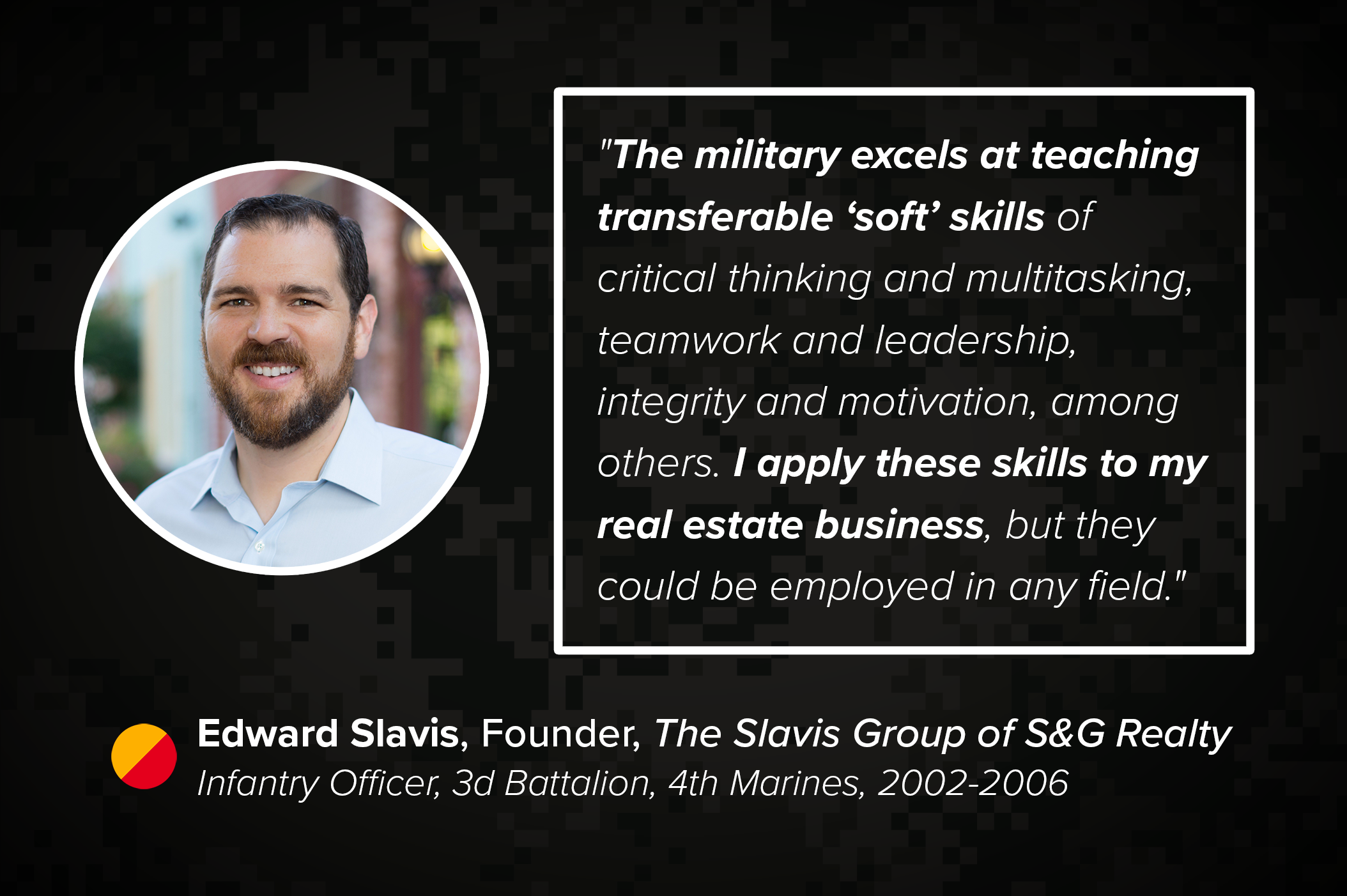
Dave Liniger, founder of RE/MAX, says the military gave him the maturity and confidence to meet the realities of starting a company. “The military really gave me the chance to grow up,” Liniger shared. “It also taught me self-discipline and a sense of responsibility.”
If you need help coming up with an idea, consider the following:
- Let your military experience inspire your business idea: Military experience can often translate directly into the business world and present obvious business ideas. For example, Marc Alacqua, Steve Davis and Altaf Bahora took the same type of technology they used in intelligence for special operations forces in Afghanistan to build a data fusion and content analytics tool. The company they founded, Signafire, counts JP Morgan, Chase, Major League Soccer and Blackberry among its clients.
- Find a business idea that helps other veterans: Veterans can also create business ideas based on helping other veterans. For example, Natalie Oliverio founded Military Talent Partners, which connects employers with veteran job candidates and Tony Weedn built a military-only social network called BaseConnect.
Don’t worry about having a seemingly bad business idea. Successful ventures like Craigslist and Peloton defied the odds and market expectations.
2. Write a business plan.
After settling on a great business idea, it’s time to create your road map to success via a business plan.
Business plans outline your business goals and how you plan to achieve them. For example, your business plan will include a marketing plan that details your product positioning, target audience, optimal messaging and the best marketing channels, such as social media, direct mail and print advertising. Additionally, you’ll need a business plan when it’s time to seek funding (see below).
Consider the following resources to help veterans write their business plans:
- SBA business plan resources: The SBA’s business plan resources can help you write a traditional or lean business plan. Additionally, the SBA Learning Center provides downloadable examples of business plans.
- Online business plan overview course: Massachusetts Institute of Technology’s OpenCourseWare resource features a free course called Introduction and Overview of Business Plans. This hour-long video lecture is given by Joe Hadzima, a senior lecturer at the Martin Trust Center for MIT Entrepreneurship.
Don’t be tempted to skip the business plan ― it’s the best way to centralize your thoughts and goals in a concise document that can evolve over time.
3. Find funding for your veteran-owned business.
Veterans have more incentives and funding options available than civilian entrepreneurs. Consider the following funding sources. Some, though not all, are specifically for veterans.
Crowdfunding
With crowdfunding, you receive money from individuals who want to donate to your business. This money isn’t a loan, so you typically wouldn’t have to pay it back.
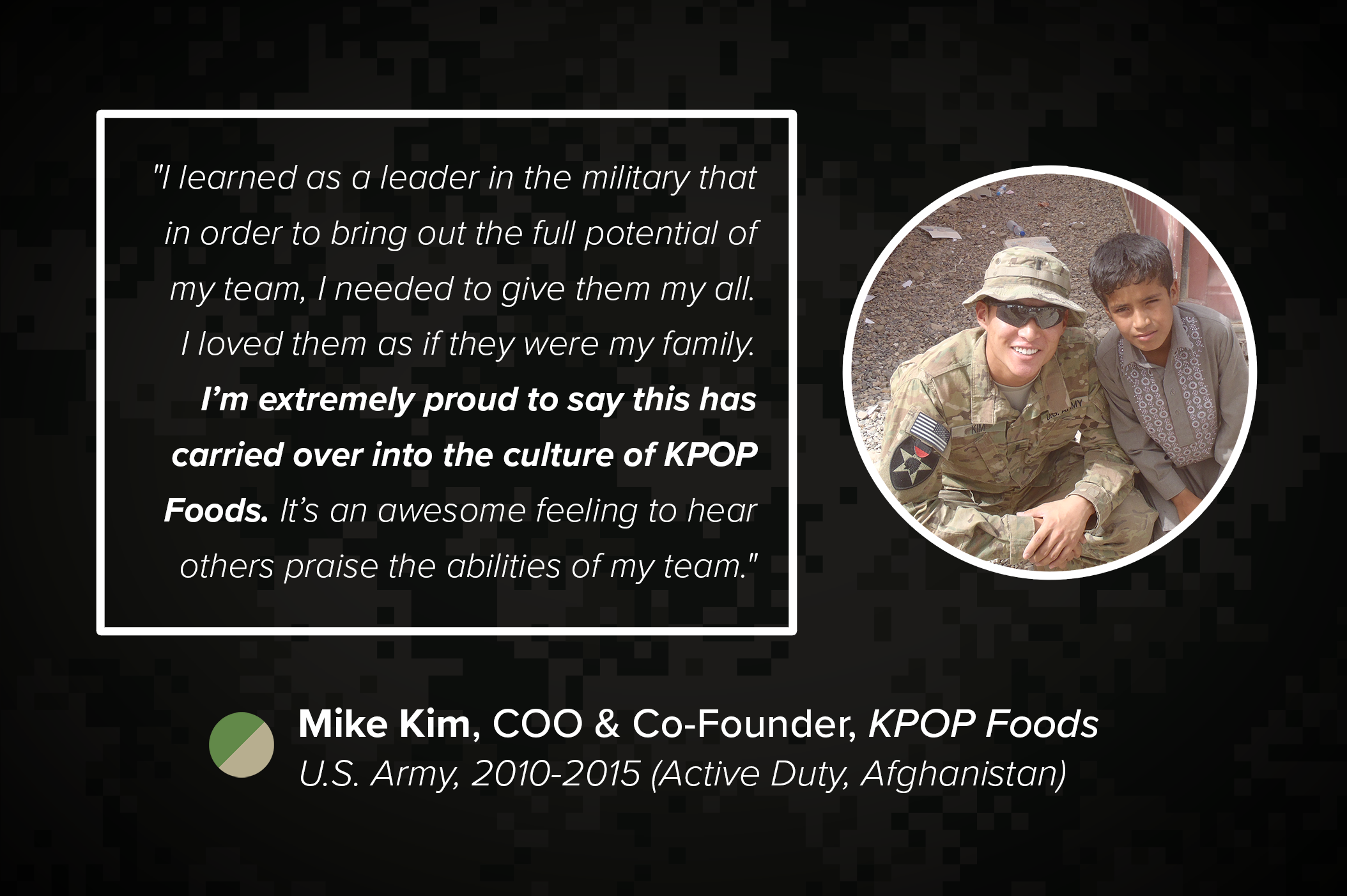
Mike Kim, a U.S. Army veteran, used Kickstarter to launch KPOP Foods. He and his co-founder set a $10,000 investment goal for their flagship product, KPOP Korean Chili Sauce. They blew past it, reaching $10,000 in eight hours. In total, they received $37,627 in pledges from 1,219 backers.
Kim says his experience as an Army project manager in Southern Afghanistan taught him resourcefulness and a can-do attitude.
“Launching my own business, I never tell myself I can’t accomplish a task,” Kim shared. “I ask myself instead how I’m going to accomplish a task. Doing this over and over again, you’ll be surprised at your own resourcefulness and creativity.”
Here are some resources to help make crowdfunding work for your veteran-owned startup:
- North American Securities Administrators Association (NASAA) guidance: The NASAA provides helpful tips on federal regulations for equity-based crowdfunding. The online resource is called Small Business Advisory: Crowdfunding.
- SCORE’s financing guide: SCORE, an SBA partner, provides a small business guide called Simple Steps to Choosing the Right Financing that includes a section on crowdfunding options.
Veteran-specific investments
Venture capital firms invest in your startup in exchange for partial control, equity and sometimes a seat on your company’s board. Some VC firms and angel investors work exclusively with veteran entrepreneurs.
Consider the following investment options for veteran entrepreneurs:
- Hivers and Strivers: Hivers and Strivers is an angel investment group focused on early-stage investments to support startups founded and run by graduates of the U.S. military academies.
- Veteran Ventures Capital: Veteran Ventures Capital provides investment opportunities to businesses with veterans in leadership positions.
- Task Force X Capital: Task Force X Capital is a venture capital firm with veteran-led advisory support. It’s focused on early-stage veteran startups.
Loans
Small business loans for veterans are another excellent option. Here are two resources to consider:
- Veterans Business Fund: Veterans Business Fund is a nonprofit that offers noninterest-bearing loans to veteran small business owners.
- Veteran Business Outreach Center: The Veteran Business Outreach Center program offers referrals to funding programs for prospective veteran entrepreneurs. The resource also offers training and counseling.
Grants
Business grants aren’t loans; you’re not required to repay them. Here are some veteran-specific resources for grant funding:
- The Veteran Entrepreneur Portal (VEP): The Veteran Entrepreneur Portal is a resource provided by the U.S. Department of Veterans Affairs (VA). Veterans can use this searchable website to find grants.
- Warrior Rising Veteran Grants: Warrior Rising Veteran Grants is a nonprofit that supports veteran entrepreneurs, offering grants, financing, mentoring and business support.
- Idea Cafe Grants: Veteran entrepreneurs and existing small business owners can apply with Idea Cafe Grants for $1,000 small business grants.
Women veterans can also explore specific business grants for women to gain additional funding options.
Resources for veterans who want to buy a franchise
If starting a business from scratch seems overwhelming, consider buying a franchise. Franchise costs can vary widely, with some of the cheapest franchises having minimal fees and a low initial investment. Plus, when you buy into a franchise, you get upfront guidance from the franchisor and begin your career owning a business with an already well-established brand.
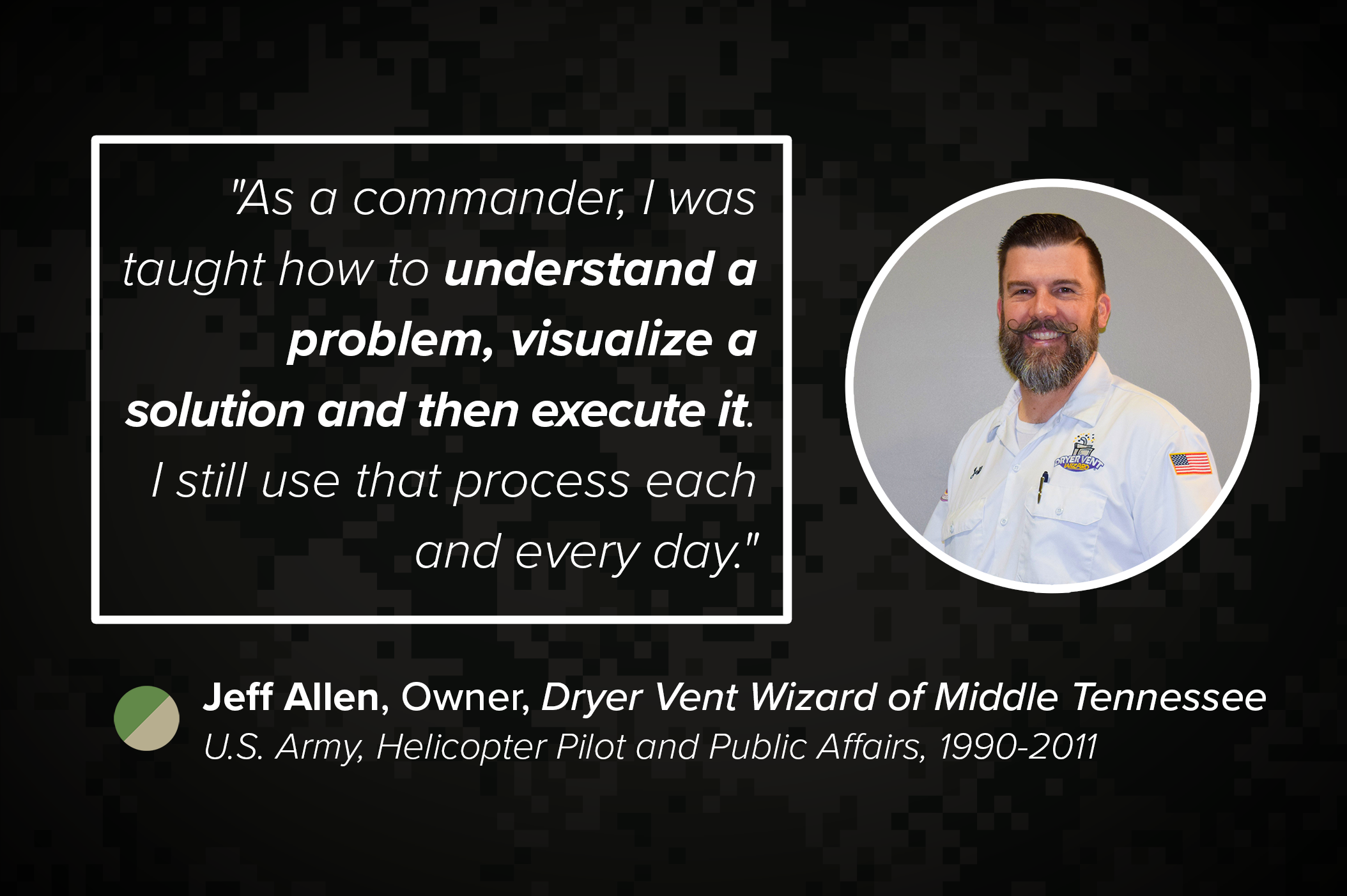
Jeff Allen, an Army helicopter pilot and current franchise owner, had just transitioned to a public affairs job at the Pentagon when a life-changing event altered his perspective.
“On September 11, 2001, I was sitting at my desk when the Pentagon was attacked,” Allen recalled. “My team survived and, while I did take a brief hiatus, I ended up returning to active duty for another 10 years once the war started.”
When he finally did retire, Allen looked for a franchising opportunity that matched the mission he’d chosen for his life.
“Protecting people is in my DNA and I took that with me when it came time to start my own business,” Allen shared. “I chose to open Dryer Vent Wizard of Middle Tennessee, a business that helps prevent dryer fires through regular maintenance and inspections.”
Allen saved money during his military career to become an entrepreneur after retiring from active duty. Regarding choosing a franchise, here’s his advice: “You have to find the business that fits you and your lifestyle best.”
Here are some resources for veterans considering buying into a franchise:
- The International Franchise Association Foundation: The International Franchise Association Foundation’s VetFran program helps veterans find training and partnership opportunities with franchise companies.
- International Franchise Association: In an article called 5 Tips for Military Veterans Interested in Franchise Ownership, the International Franchise Association provides tips and considerations on franchise ownership.
- 7-Eleven: With 7-Eleven’s Veterans Franchising program, 7-Eleven offers special financing for qualified veterans of up to 20 percent off the initial franchise fee and 65 percent financing through 7-Eleven.
Resources for obtaining government contracts for veteran-owned businesses
As a veteran, you’re already familiar with the federal government. You can continue this relationship as a veteran business owner by becoming a registered government contractor. Securing a government contract means steady work.
The General Services Administration oversees contracts for the federal government and considers veteran-owned businesses for contracts before civilian contractors.
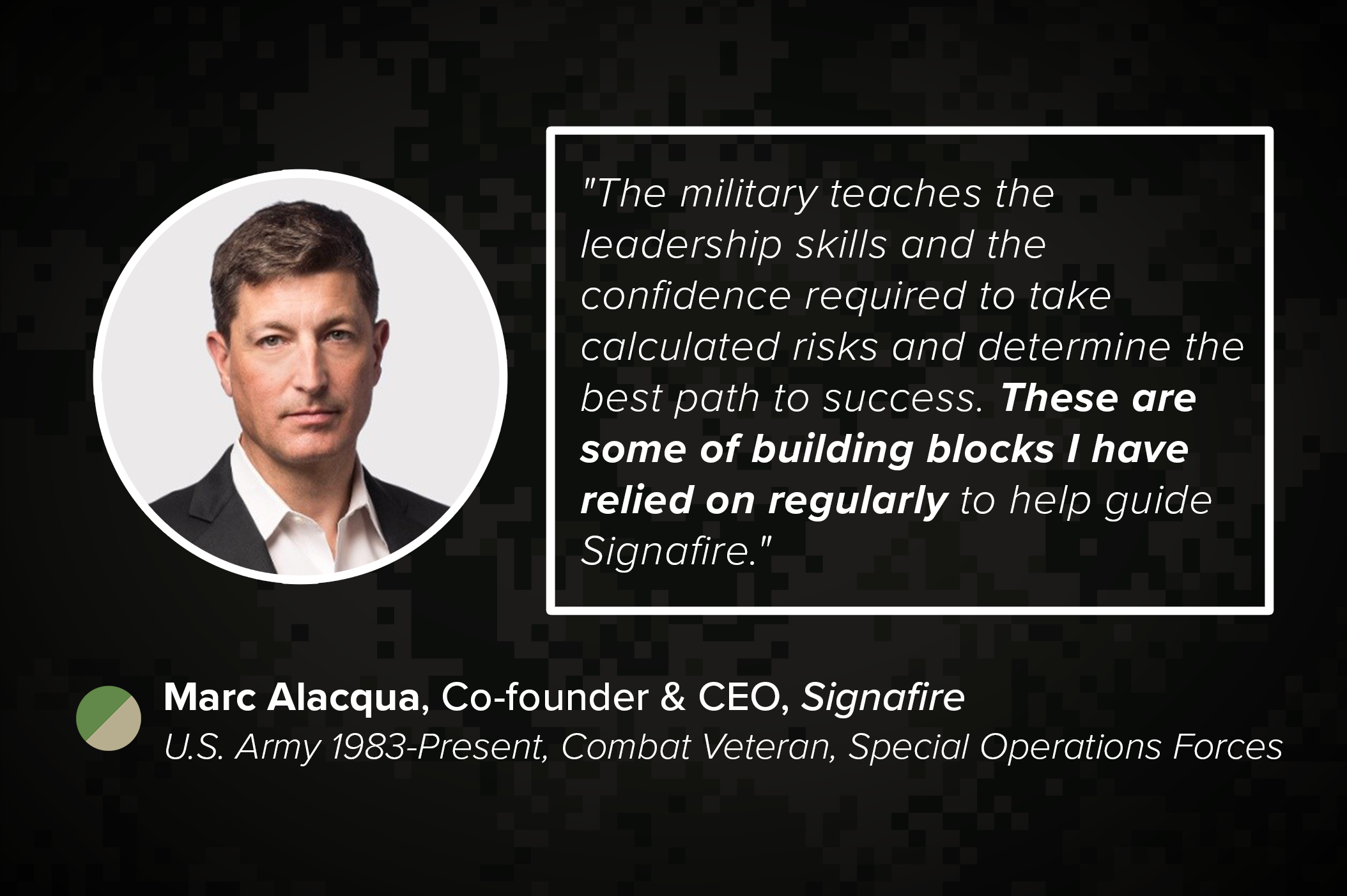
This veterans-first policy levels the playing field for veteran-owned small businesses bidding against larger firms. Here are some resources to help you do business with the government:
- Veteran Entrepreneur Portal: The Veteran Entrepreneur Portal provides resources for training, financing, networking, VA procurement and more.
- Veteran Institute for Procurement: The Veteran Institute for Procurement provides a three-day, 27-hour certification program for veteran-owned businesses that want to enter the federal marketplace.
- System for Award Management: The System for Award Management is an account portal for federal government contractors. It’s free to register your business.
- National Veteran Small Business Coalition: The National Veteran Small Business Coalition is an organization dedicated to helping veteran-owned businesses get first consideration for federal prime and subcontract procurement.
- Service-Disabled Veteran-Owned Small Business Program: Joining the Service-Disabled Veteran-Owned Small Business Program gives your small business an edge when competing for federal “set-aside” contracts.
- National Veteran-Owned Business Association: The National Veteran-Owned Business Association is a nonprofit that certifies businesses as Veteran Business Enterprises for American corporations looking to partner with veteran-owned and operated businesses.
Education and training resources for veteran-owned businesses
Entrepreneurship requires a broad skill set, including small business accounting basics and interviewing skills.
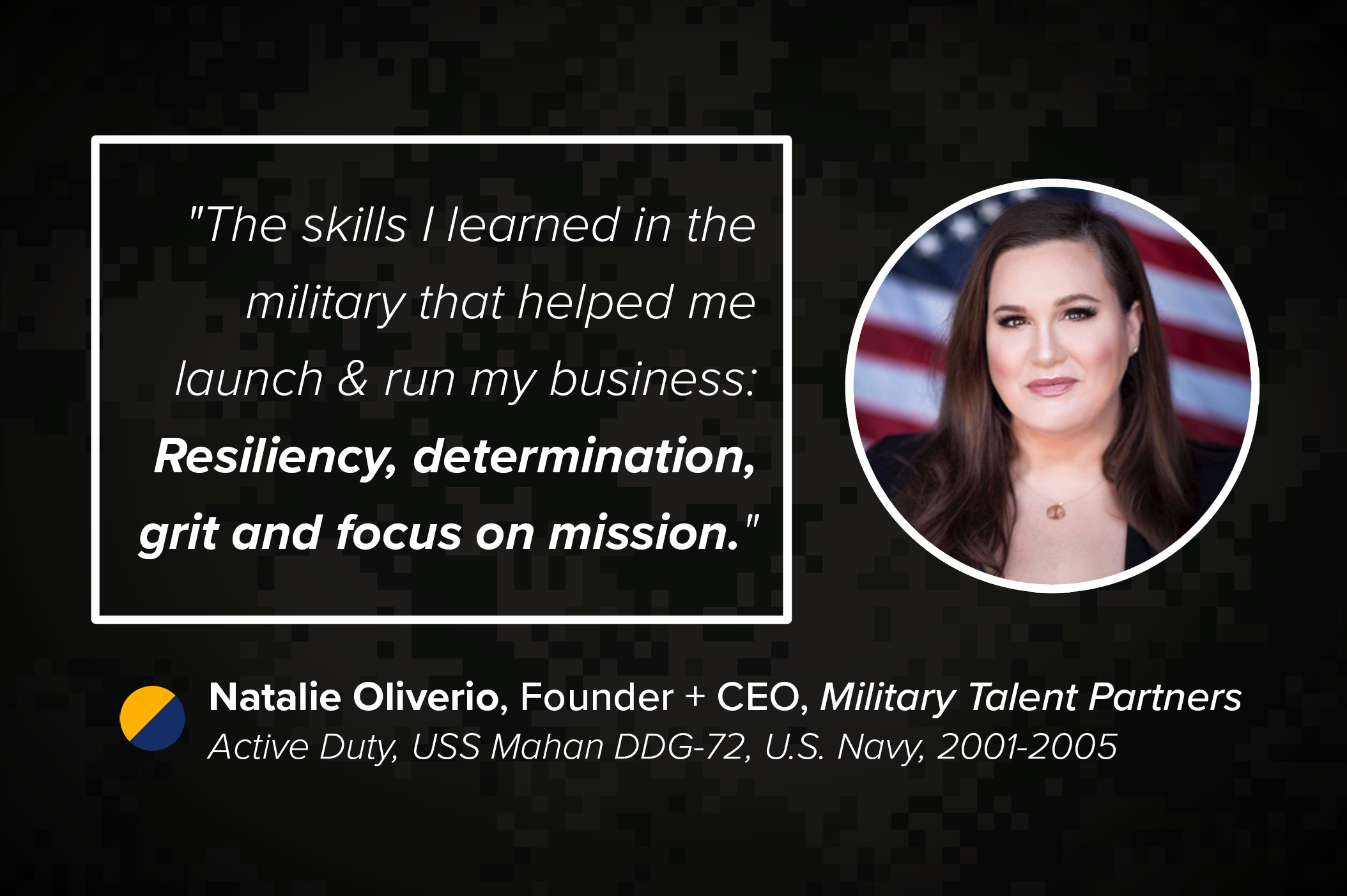
The GI Bill has helped cover all or some of the costs of higher education for millions of vets, which is good because education isn’t cheap.
Chris Rawlings is a former Marine who did two tours of duty in Iraq. He’s now the owner of Veteran LED, a lighting and energy design company. Rawlings invested in his education after leaving the military, attending the Entrepreneur Bootcamp for Veterans at Florida State University.
“In addition to the education it provided, I tapped into such specialty providers as legal services, marketing and website design,” Rawlings shared. “Those resources helped keep me from feeling overwhelmed about parts of my business that required specialized training.”
Here’s information about programs and resources that help veterans learn essential business skills:
- Veterans Business Resource Center: Veterans and their families can get free business training and counseling from the Veterans Business Resource Center.
- Boots to Business Reboot: The SBA offers a two-day course called Boots to Business Reboot that teaches business fundamentals and techniques for evaluating the feasibility of your business.
- Entrepreneurship Bootcamp for Veterans (EBV): The EBV provides small business training to post-9/11 veterans and military family members who serve in a caregiver role to a veteran with a service-connected disability.
- Vet to CEO: Vet to CEO is a free online program designed and facilitated by veteran entrepreneurs.
- Training programs: Hiring Our Heroes Corporate Fellowship Program and the S. Chamber of Commerce Foundation provide training programs to help transition service members into the civilian workforce with management training and hands-on experience.
- Veteran Women Igniting the Spirit of Entrepreneurship (V-WISE): V-WISE provides an extensive training program in entrepreneurship and small business management for female vets.
Networking and mentorship resources for veterans
Veterans are a tight-knit group and professional connections in the business world are just as crucial as they are in the military. Many organizations, both nonprofit and paid, work to connect veterans with business professionals and mentors.
Paul Dillon, a U.S. Army Reserve first lieutenant and service-disabled veteran of the Vietnam War, helped pioneer one such organization. Dillon, who retired from consulting in 2006, started a second career helping veterans start their own businesses.
“My business didn’t start out with the idea of helping veterans,” Dillon explained. “I started out thinking that I was going to provide project management and business development services, but that didn’t work out. I had to pivot several times before I found a niche that worked.”
Dillon created the concept for a business incubator in Chicago, which eventually became Bunker Labs, a national nonprofit that assists veteran entrepreneurs.
Here are some other resources to connect veterans with partners in the business world:
- American Corporate Partners (ACP): ACP helps military veterans connect with mentors in the business community to help grow their businesses. Membership in ACP is free for 12 months.
- Patriot Boot Camp: Patriot Boot Camp is a free three-day event that provides educational training and one-on-one mentoring to inspire and advance veteran entrepreneurs in technology-related businesses.
- SCORE: SCORE helps veteran entrepreneurs find mentors, workshops and other resources in local areas.
- VetsinTech: VetsinTech equips veteran entrepreneurs and their spouses with mentorship, educational programs and workshops for tech startups.
- Hire Heroes USA: Hire Heroes USA is a veteran nonprofit that matches service members with successful professionals for one-hour phone call sessions.
Use LinkedIn to network and connect with other veterans to grow your business, find partners, seek advice and more.
Entrepreneurial resources for service-disabled veterans
There are educational and financial resources specific to service-disabled veteran business owners, including VA grants and free comprehensive business programs at major universities.
Here are a few resources to help service-disabled veterans get their businesses going:
- Self-employment grants: The VA offers a self-employment program for service-disabled vets. Those who are interested can contact their local VA office.
- Veteran Readiness and Employment: The VA’s Veteran Readiness and Employment resources include grant funding to purchase licenses and bonds, inventory and specialized equipment for eligible veterans. The VA also offers educational and career counseling.
- Dog Tag Bakery: The Dog Tag Bakery is a five-month fellowship for service-disabled veterans, military spouses and caregivers that offers Georgetown University classes and real-life work experience at a small bakery.
- National Veterans Entrepreneurship Programs: These programs offer free training for disabled veterans modeled on a comprehensive entrepreneurship curriculum. Programs currently exist for Oklahoma State University, the University of Tennessee at Chattanooga and the University of Florida.
Additional resources for veteran entrepreneurs
The following resources are also excellent options for veteran entrepreneurs to explore:
- The Office of Veterans Business Development: At the Office of Veterans Business Development, veterans, their dependents and survivors can find small business training, resources and opportunities at a nearby district office.
- The Rosie Network: The Rosie Network is a nonprofit that offers help with training, financing and networking resources for veteran small business owners.
- Military-transition.org: The Military-transition.org website provides a wealth of data and resources to help with the transition from military to civilian life.
Impact of COVID-19 on veteran businesses
Small business owners across the country bore the brunt of the COVID-19 pandemic and veteran-owned businesses weren’t immune. The federal government took steps to help struggling small business owners, signing the Coronavirus Aid, Relief and Economic Security Act into law in March 2020 and later the Paycheck Protection Program. The SBA’s Economic Injury Disaster Loans provided business owners with low-interest rate loans they have 30 years to pay back.
Now that the pandemic is behind us, surviving small businesses have learned valuable lessons in being flexible with their business models. Some of the effects of the pandemic have persisted, such as a continued shift toward e-commerce and BOPIS (buy online, pick up in-store) models and a preference among customers for contactless payments.
The military prepares veterans for success
Many veterans enter entrepreneurship equipped with the soft skills necessary for business success. “The military excels at teaching transferable ‘soft’ skills of critical thinking and multitasking, teamwork and leadership, integrity and motivation, among others,” said Edward Slavis, a former U.S. Marine infantry officer who served in Iraq. “I apply these skills to my real estate business but they could be employed in any field.”
When it comes to starting a business after your military career has ended, aside from financing your business, the biggest investment you’ll make as an entrepreneur will be in your knowledge and skills.
Starting a business is a challenge, but just like in the military, you can rely on the advice and support of other service members. Contact the organizations listed in this guide and you’ll see the passion and expertise of people devoting their lives to helping veteran entrepreneurs. You’ll know that you aren’t fighting this mission alone.
Donna Fuscaldo contributed to the reporting and writing in this article. Some source interviews were conducted for a previous version of this article.

